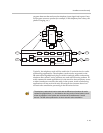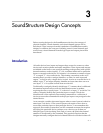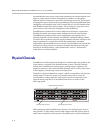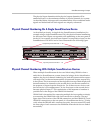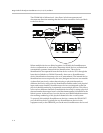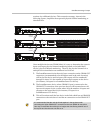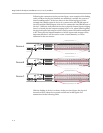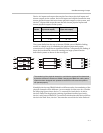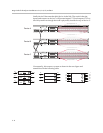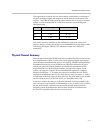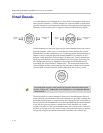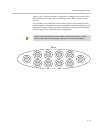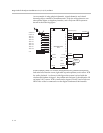
SoundStructure Design Concepts
3 - 7
Device A's inputs and outputs become the first sixteen physical inputs and
sixteen outputs on the system, device B's inputs and outputs become the next
sixteen physical inputs and next sixteen physical outputs on the system, and
device C's inputs and output become the last sixteen physical inputs and
sixteen physical outputs on the system.
The system built from the top-to-bottom, OBAM out-to-OBAM-in linking
results in a simple way of numbering the physical input and output
connections in a simple linear sequential fashion. Conceptually the linking of
these devices should be viewed as creating one large system from the
individual systems as shown in the next figure.
If multiple devices are OBAM linked in a different order, the numbering of the
physical channels will be different. As an example of what not to do, consider
the following figure where device C is connected to both device A and to
device B. Based on the physical ordering algorithm described previously,
device A only has an OBAM OUT connection which makes this device the first
device in the link. Next, device C becomes the second device in the link and
Device
Local Numbering
(input and output)
System Numbering
(input and output)
A 1 - 16 1 - 16
B 1 - 16 17 - 32
C 1 - 16 33 - 48
16 16
A
IN
OUT
OBAM
16 16
B
16 16
C
A
B
C
A
B
C
IN
OUT
OBAM
IN
OUT
OBAM
1
16
17
32
33
48
1
16
1
16
1
16
1
16
1
16
1
16
1
16
17
32
33
48
The numbering of the physical channels in a multi-device system will be determined
by how the devices are linked over OBAM. Changing the OBAM link cabling after a
system has been designed and uploaded to the devices will cause the system to
not operate properly.



